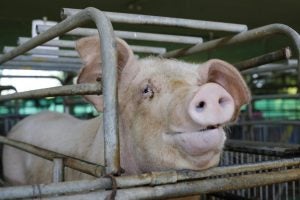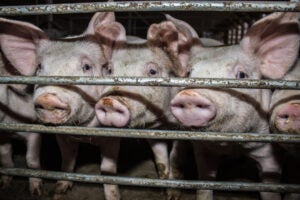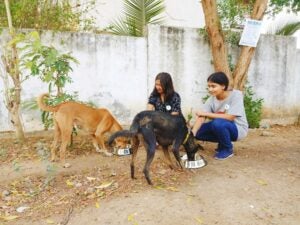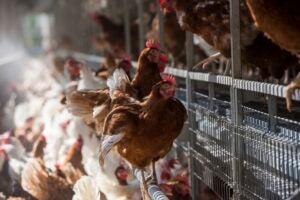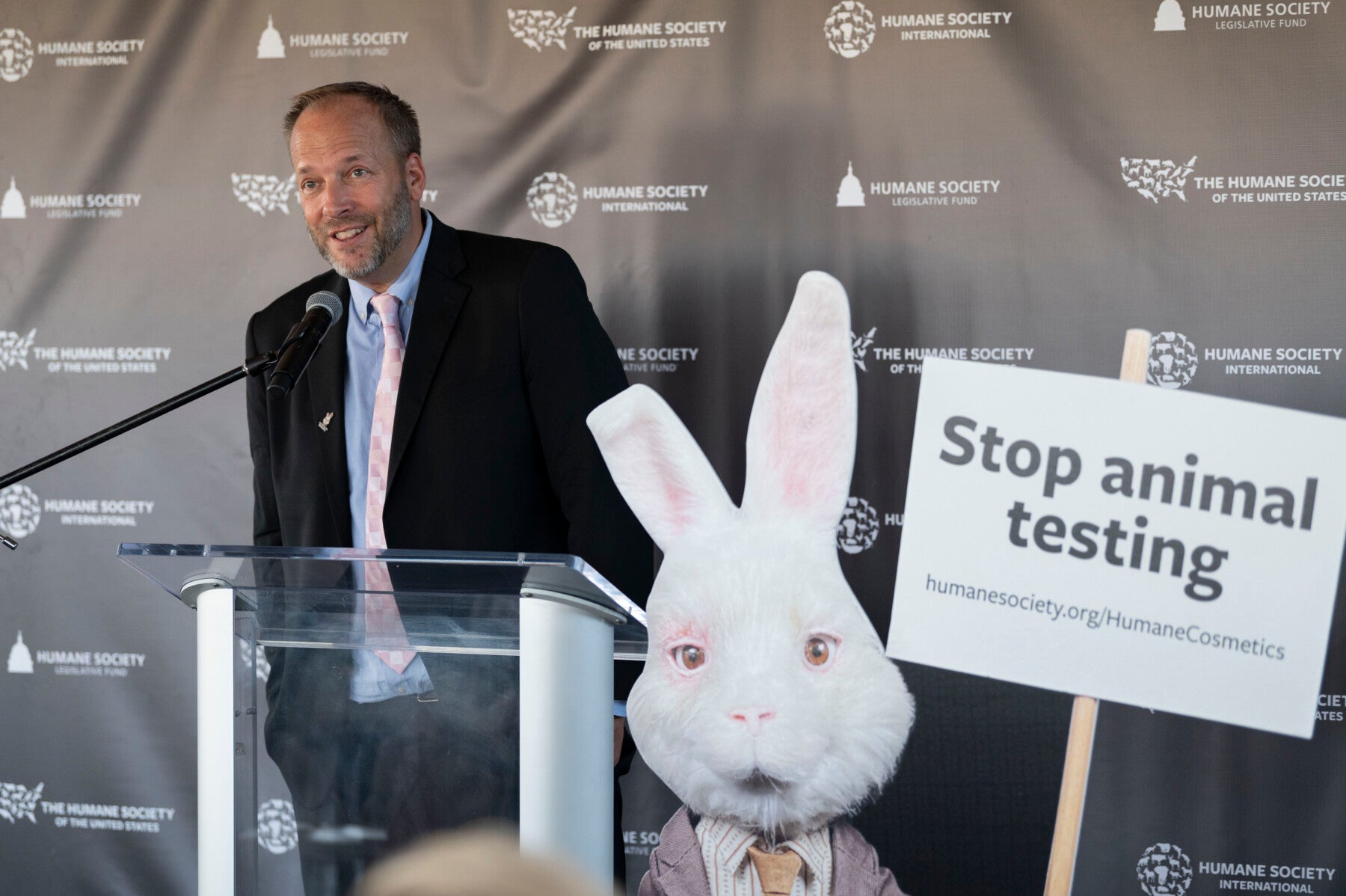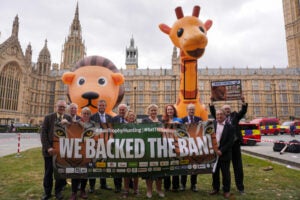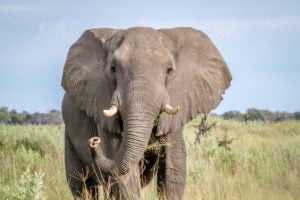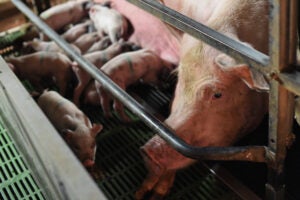
BRUSSELS—The European Commission released today the long-awaited results of its Eurobarometer survey on EU citizens’ attitudes towards animal welfare. As anticipated, the polling data confirms that the vast majority of Europeans (84%) believe that the welfare of farm animals should be better protected. Across all EU Member States, at least eight in ten respondents believe that ensuring that animals are not kept in individual cages is an important factor in meeting our ethical responsibilities to animals.
Dr Joanna Swabe, senior director of public affairs for Humane Society International/Europe, commented:
“The Eurobarometer results released today unequivocally confirm the incredible strength of citizen support in all Member States for the advancement of animal welfare. It was no secret that this poll had been conducted many months ago, but it was rumoured that the Commission leadership had been suppressing the results given their reluctance to adhere to the clear animal welfare commitments made in both the EU Farm to Fork Strategy and the formal response to the European Citizens’ Initiative to End the Cage Age.”
During a Parliamentary hearing earlier this month, Commission Vice-President Maroš Šefčovič, the new European Green Deal chief, broke the Commission’s silence on its failure to deliver the promised package of legislative proposals to revise and expand the scope of the existing body EU animal welfare legislation. Šefčovič signalled that all but the proposal on animal transport were being shelved for the foreseeable . The Eurobarometer provides a strong reminder before the EU elections that citizens care about animal welfare. The results of this survey emphasise the importance of Europe staying true to its commitment to eliminating caged farming.
“Ignoring the immense citizen support for improved animal welfare and the failure to honour the Commission’s commitments to deliver these legislative reforms is an affront to the millions of EU citizens who want better treatment of farm animals,” says Swabe. “With the European elections only months away, the Commission’s backsliding on animal welfare risks eroding ordinary citizens’ faith in the European institutions and how much they are truly working for them and their interests.”
Support for improved animal protection regulations does not come only from the general public. The Commission’s own regulatory fitness and performance programme which aims to ensure that EU laws deliver on their objectives, determined that the current animal welfare legislation is no longer fit for purpose. The European Food Safety Agency delivered scientific opinions regarding the on-farm welfare of animals, which make it clear that farm animals have complex welfare needs that cannot be met within the confines of cages and crates.
With respect to the welfare of animals on farms, the Eurobarometer survey results reveal, for example, that:
- 90% of Europeans consider that farming and breeding practices should meet basic ethical requirements.
- 91% consider that it is important to protect the welfare of farmed animals (e.g., pigs, cattle, poultry, etc.) to ensure that they have decent living conditions.
- 84% consider that in general the welfare of farmed animals in their country should be better protected than it is now
- 67% say they would like to have more information about the conditions in which farmed animals are raised in their country.
- Over eight in 10 respondents believe that ensuring that farmed animals have enough food and an adapted environment satisfying their basic needs (e.g., mud, straw, etc., depending on the species) is important in all 27 EU Member States.
- In all 27 EU Member States, more than eight in 10 respondents consider that providing farmed animals enough space to be able to move around, lie down and stand up is important.
- At least eight in 10 respondents in all 27 EU Member States consider that ensuring that people who handle the animals have sufficient skills and training is an important aspect of meeting our ethical responsibilities to animals.
- In all 27 EU Member States, over three-quarters of respondents think that banning the cutting of certain body parts of the animals unless it is necessary to protect the safety of workers/farmers (in which case anaesthesia will be used) is an important condition to meet our ethical responsibilities to animals.
- 75% think that the practice of killing one-day-old male baby chicks is unacceptable.
- Over six in 10 Europeans believe that EU animal welfare rules should apply to food imported from non-EU countries.
- Six in 10 Europeans are willing to pay more for products sourced from animal welfare-friendly farming systems. Six in 10 Europeans indicated that they look for labels identifying products sourced from animal welfare-friendly farming systems when buying food products.
Facts
- In 2020, the European Commission released its Farm to Fork strategy for a fair, healthy and environmentally friendly food system as part of its European Green Deal flagship policy package. This included a commitment to revise the existing animal welfare legislation to align it with the latest scientific evidence, broaden its scope, make it easier to enforce and ultimately ensure a higher level of animal welfare. The legislative package was due to be published in the third quarter of 2023.
- In 2021, in response to the European Citizens’ Initiative to End the Cage Age, which garnered nearly 1.4 million validated signatures, the Commission also promised to deliver proposals to end the caged confinement of animals kept for food by the end of 2023.
- The Eurobarometer is the official polling instrument that is used by the European Commission, the European Parliament and other EU institutions and agencies to monitor public opinion on EU issues and attitudes towards specific subjects.
- Prior to today’s publication, Special Eurobarometer report 442 on Attitudes of Europeans towards Animal Welfare was the most recent EU-wide survey on this issue and was published in 2016. At that time, more than nine in 10 EU respondents said they believed that it is important to protect the welfare of farmed animals (94%).
ENDS
Media contact: Yavor Gechev, communications director for HSI/Europe: ygechev@hsi.org ; +359889468098 ; +393515266629

